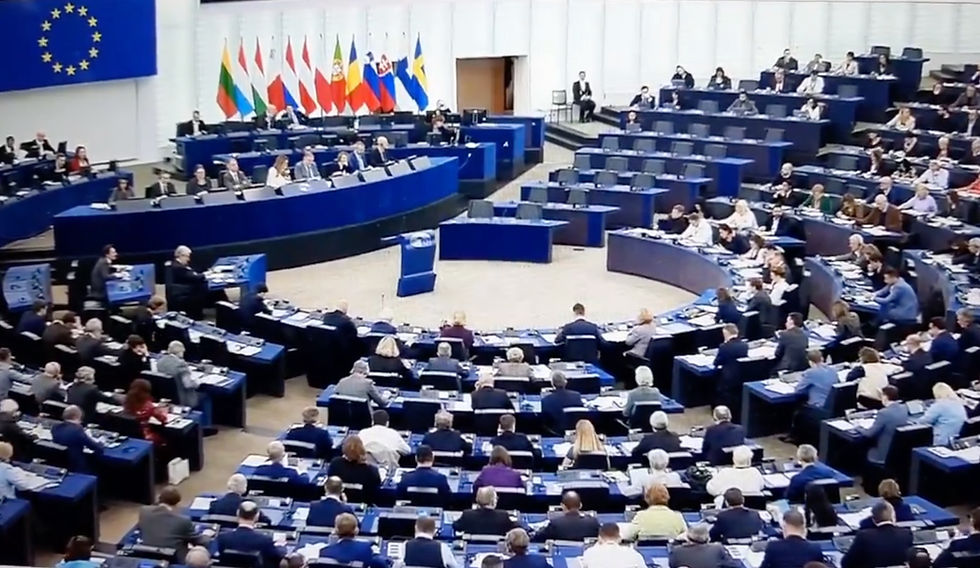European Parliament votes in favour of labelling for NGTs, but against risk assessment and coexistence rules
- BiO ReporterIn

- Feb 8, 2024
- 4 min read
On 7 February 2020, the European Parliament voted on the legislative proposal on new genetic technologies (NGTs) in plants. Many urgent warnings against a relaxation of the rules, in the form of petitions, letters to MEPs, protests from farmers and citizens as well as technical and scientific concerns were largely ignored. But surprisingly, the vote was close and did not follow the proposals of the Environment and Agriculture Committee on all points. The parliamentarians voted in favour of the labelling of new genetic engineering products along the entire value chain from seed to supermarket shelf. Contrary to this, however, there should be no coexistence measures to maintain GMO-free agriculture, no risk assessment prior to authorisation and no information on the traceability of GMO products. The question of patentability has not been clarified.

The plenary of the EU Parliament during the vote on the legislative proposal on NGTs. (Screenshot BiO Reporter International)
Comments on the decisions of the European Parliament
Martin Häusling: "Irresponsible and in the interests of the agricultural industry"
"What the conservatives have supported here with the votes of the liberals and the right is, for me, a political revelation and defies all reason. It is irresponsible that the way has been cleared for highly questionable regulations and negligent handling of new genetic engineering in the interests of the agricultural industry without sufficient consultation. Hundreds of scientists and scientific authorities (BfN, ANSES), civil society, organic organisations and hundreds of companies have been up in arms against this arbitrary power politics and their voices have not been heard. This proposal violates the European precautionary principle and the issue of patents on breeding remains unresolved. At least the realisation has prevailed that food and feed produced using new genetic engineering must also be labelled for farmers, breeders and consumers. Traceability should also be guaranteed. Concerning GMO-free cultivation and processing, however, most MEPs opposed clear coexistence measures and liability rules," commented Martin Häusling, agricultural policy spokesperson for the Greens in the European Parliament and member of the Environment and Health Committee.
Alexander Hissting: "Clear improvement of the proposal, but Özdemir must stand up for coexistence rules

Alexander Hissting: "Clear improvement of the proposal, Özdemir must stand up for coexistence rules
VLOG Managing Director Alexander Hissting (Verband Lebensmittel ohne Gentechnik) describes the European Parliament's decision to eliminate coexistence rules and risk assessment as bad news for agriculture and the environment. However, the vote in favour of the labelling of new genetic engineering products along the entire value chain is a victory. "The European Parliament's vote is a clear improvement on the EU Commission's proposal. Transparent labelling is the basis for freedom of choice. This is a step in the right direction, which must now be consistently pursued in the negotiations with the EU Commission and the Council of Ministers," commented Hissting. However, the vote in the EP also has many downsides. "In addition to labelling, we also need uniform coexistence rules for the cultivation of plants and information on the traceability of new genetic engineering products," Hissting states. "This is the only way to keep the range of organic and "Ohne Gentechnik" foods GMO-free.
"Fortunately, the parliamentary vote is far from the last word. Now it's up to the member states in the EU Council of Ministers. And I certainly have hope, especially after the clear words of Federal Agriculture Minister Cem Özdemir in Brussels and Berlin. I am certain that if he makes a strong case for this with the other states, there can be a sensible solution for all sides."
With its vote, the European Parliament has initially defined its position, which it will then introduce into the negotiations with the EU Commission and member states, explains Hissting. The states have not yet been able to reach an agreement. It seems quite possible that the issue of genetic engineering re-regulation will still play a role in the European elections in June 2024.
Jan Plagge: "Protect breeders and farmers from patents and safeguard the integrity of organic and conventional GMO-free production"

"The MEPs' vote is full of contradictions, as it recognises some important problems related to the deregulation of NGTs, but does not offer any concrete solutions and exposes farmers and breeders to the takeover of genetic resources by companies through patents," analyses Jan Plagge, President of Bioland and IFOAM Organics Europe. "A majority of MEPs voted in favour of weakening biosafety requirements for NGTs, but also in favour of maintaining the traceability of NGTs throughout production and the possibility of national coexistence measures to protect organic farming," says Jan Plagge, President of IFOAM Organics Europe.
The Parliament has also recognised that patents on seeds pose a threat to the European breeding sector and has sent a clear message that patent protection should not extend to genetic material that can also be obtained through conventional breeding.
National governments should first find a legal solution to protect breeders and farmers from patents and preserve the integrity of organic and conventional GMO-free production before weakening biosafety requirements. Organic producers are counting on Member States in the Council to uphold their right to traceability and national coexistence measures to ensure the freedom of farmers, food producers and consumers not to use genetically engineered techniques. Jan Plagge
More comments:
Karin Heinze, Summary of statements










Comments